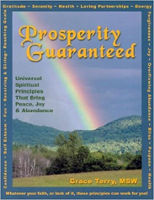
Image by Gerd Altmann
Several years ago when I decided to attract my ideal spiritual partner, I created a long list of qualities and characteristics I would like to have in that partner. I then released my desire to the Universe and asked for "this or something better." Well, I got everything I asked for and MORE!
The Universe, in its infinite wisdom, sent me a partner who not only met all the criteria I had asked for but also knew how to make money work for him. Unlike me, he had been systematically saving and investing money for many years. (If you don't think that's an absolute miracle, I could tell you about my last husband!)
When we met, I was almost forty years old, had a master's degree, had professional credentials and licenses, had owned my own business for many years, had earned lots of money, and had spent all that I earned! And I had spent most of it on things that lost value significantly as soon as I paid for them. I was financially illiterate. The Universe knew I needed someone to help me learn to make money work for me!
Now, there are other ways to become financially literate. This is simply the way the Universe and I decided I would begin to be educated in these matters. I find it quite convenient.
Financial Literacy
Without financial literacy, I generated a great deal of income but had no clue as to how to effectively manage the assets for my best good. Do you remember the second Rocky movie? Rocky had won the big fight and now had LOTS of money, which he proceeded to spend on things like cars, clothes, and expensive jewelry. Soon he was flat broke again.
We see this phenomenon in real life with lottery winners. Just recently I heard that approximately one-third of lottery winners declare bankruptcy within a few years of winning big.
As I write this, Jim and I have been together for seven years. Being in partnership with this awesome man has taught me many things. (I think he would agree he has also learned a few things through me!)
The things I understand today about financial literacy I have learned from him and from some limited reading. My purpose in this chapter is just to get you to thinking and to encourage you to pursue your financial education with other teachers.
Basically, what I know about financial management can be summarized in this way:
#1. Money spent on consumer goods is money devalued.
Consumer goods immediately lose monetary value when they are purchased. If the consumer goods are charged on a credit card and are not paid off with the first statement, the interest and fees charged increase the loss of value.
This is not to imply that no money should ever be spent on consumer goods. This is to ask the question, "How much is enough?" In our materialistic culture, the typical answer is, "No amount is ever enough."
No matter how much "stuff" we have, we are programmed by the advertising media to think that we need more and more and more. We are programmed to believe that when we acquire the "right stuff" we will be happy. Of course, it's a lie, but if we don't know what else to do, we keep buying newer, bigger, supposedly better stuff -- even if we have to go into debt to acquire it.
Someone said, "You can never get enough of what you don't want." What I think this means is this: What we really want is to feel loved, to feel valuable, and to feel a sense of meaning and purpose in our lives. If we are expecting material things to make us feel good, to make us feel lovable, to make us feel important, we can never get enough. It just doesn't work.
Jim and I choose to live simply. We enjoy the things we purchase. It just seems that the longer we practice prosperity principles, the less we want to buy. Beyond a reasonable level of comfort and convenience, we are quite content.
Like us, you may find that as you grow spiritually, you use or consume less and enjoy it more!
I remember the first time my spiritual teacher told me to write down my list of things I want. On that first list was "gold and diamond jewelry." Within a relatively short time I had diamond rings on both my hands, gold chains, and other expensive pieces of jewelry. I enjoyed them greatly at the time.
Gradually, over the years, jewelry has become less and less important to me. I have lost or given away all of my rings except one -- a rather modest diamond ring that I consider my wedding ring. I wear it only on special occasions.
If I had it to do over, knowing what I know now, some of the money that I exchanged for jewelry would have been saved and invested. That money would still be working for me by earning interest and dividends.
Whatever is on your list, I encourage you to go for it! I support you 100 percent without condition. If you want diamond rings on all of your fingers and half your toes -- go for it! And enjoy it! And I encourage you to know that there are some things money will not buy.
#2. Regular saving and investing is appropriate and wise.
DON'T save money for a rainy day or for a medical emergency or for any reason motivated by fear. Save money so it can work for you by earning you interest! Remember always one of the basic tenets of prosperity is "Money works for me!" Money is a wonderful servant and a terrible master.
I have made several references to our materialistic, secular culture. Living in this culture is a challenge and a blessing. One of the blessings is that we have created an economic system whereby anyone can become wealthy and financially independent, which can be defined as the situation in which a person's money is earning so much money for them that the person does not ever have to work for money to pay their living expenses.
In our culture, there is no caste system that decides a child's fate before it is born. Today, in the United States, a person with average intelligence and physical health can acquire financial resources and invest them in such a way that the money earns money for that investor. If the investor contributes systematically to his/her savings plan over a certain period of time, the compounded interest alone on that savings principle can amount to more than the investor might ever earn in salaries, wages, commissions, or contract fees in a lifetime.
It is reported that Albert Einstein once said that "compound interest is the greatest power in the Universe."
My husband Jim and I now hold financial assets to the extent that we never have to earn another penny and can continue to live at our present standard of living or better until we are 100 years old and can still expect to have money left in our estate.
I will share with you now that only about 10 to 12 percent of those assets is money that one of us actually earned in salaries. The rest is interest and dividends paid on investments and compounded over a relatively short period of time -- approximately 15 years. (By the way, it is truly phenomenal how those assets began to grow when we started tithing on them!)
Another blessing of our culture is that it is common for employers to provide benefits to their employees in the form of 401K and 403B programs. With these programs the employer actually matches money that the employee saves up to a certain percentage of the employee's income. What a deal! Ironically, many employees do not take advantage of such benefits. All of their paychecks are being spent paying interest on credit cards for things they can't even remember buying!
If you have not done so already, I challenge you to begin to consider this question, "How can I make money work for me?"
#3. Invest (wisely) in the stock market
Money wisely invested in the stock market can work much more efficiently for me than money invested in so-called safer ways. Traditional thought is that investing in the stock market is too risky for the average person. Don't believe it! According to the Vanguard Group, a company which sells mutual funds, the average annual return on money invested in the stock market between 1926 and 1999 was 11.3 percent. This rate of return is much higher than the nominal rate of interest paid on passbook savings accounts, money market accounts, or treasury bills.
There is a great deal of media attention being paid to people who are making and losing huge fortunes in the stock market. There is less media attention given to people who just quietly continue, month after month, year after year, to build financial assets that eventually equal financial independence.
If you have not done so already, begin to read and talk to people and do whatever you can to become financially literate -- to understand how our economic system works and how you can make it work for you. Information is easily available. You can start by reading the financial section of your newspaper, if you don't do that already. You can read the Wall Street Journal. You can watch "Wall Street Week" on Friday nights on PBS. The bookstores are full of books that can help you get started. (An excellent book that Jim and I both enjoyed and recommend is Rich Dad, Poor Dad: What the Rich Teach Their Kids About Money - That the Poor and Middle Class Do Not!)
Do you know people who invest in the stock market with good results? If so, ask them how they got started. Ask them how they decide where to invest. Community colleges often offer introductory courses on investing for a nominal registration fee. If your employer offers a savings and investment plan, talk with the benefits coordinator and find out everything he or she can tell you about the benefit available to you there.
One word of caution: Do not trust everything a financial services professional might tell you. Get several opinions. Many financial services professionals are honest people with integrity who are following their bliss and who are sincerely committed to the best interests of their clients. Some, however, are just trying to pay the minimum balance on this month's credit card bill! If you do decide to use the services of a financial professional, interview several before choosing one and ask the Universe to send you to the right person. Let your inner wisdom guide you to that person.
Money and Spiritual Principles?
You might be thinking, what does all of this stuff about investing in the stock market have to do with spiritual principles?
Here is my only answer to that -- as spiritual beings on a human journey, it's all spiritual!
Learning to make money work for us can be a self-empowerment process in itself. It can free us to follow our bliss and serve the world in ways that would never be possible if we spend a significant portion of our time working for money and paying interest on consumer debt.
Reprinted with permission of the publisher,
Lucky Press. ©2002. www.luckypress.com
Article Source
 Prosperity Guaranteed: Universal Spiritual Principles That Bring Peace, Joy, and Abundance
Prosperity Guaranteed: Universal Spiritual Principles That Bring Peace, Joy, and Abundance
by Grace Terry, MSW.
Whatever your faith, or lack of it, these principles can work for you. Universal spiritual principles that bring peace, joy, and abundance.
Info/Order this book.
About the Author
 Grace Terry, MSW, (a.k.a., “Amazing Grace”) is a wise woman in the time-honored tradition of the Wounded Healer. She brings to her work an extraordinarily helpful combination of professional training and lived experience. Grace earned her Master of Social Work degree in 1980 and has been successfully practicing as a professional helper since then. She has extensive experience in mental/behavioral health and wellness, substance abuse treatment, hospice social work, medical social work, and geriatric care. In addition to having been a licensed mental health professional for over twenty years, she is now an “authorpreneurial” mind/body/spirit wellness coach specializing in the management of pain that keeps coming back (chronic pain), whether the pain is physical, emotional, spiritual, or any combination of these. For more info, visit her website AngelsAbide.com
Grace Terry, MSW, (a.k.a., “Amazing Grace”) is a wise woman in the time-honored tradition of the Wounded Healer. She brings to her work an extraordinarily helpful combination of professional training and lived experience. Grace earned her Master of Social Work degree in 1980 and has been successfully practicing as a professional helper since then. She has extensive experience in mental/behavioral health and wellness, substance abuse treatment, hospice social work, medical social work, and geriatric care. In addition to having been a licensed mental health professional for over twenty years, she is now an “authorpreneurial” mind/body/spirit wellness coach specializing in the management of pain that keeps coming back (chronic pain), whether the pain is physical, emotional, spiritual, or any combination of these. For more info, visit her website AngelsAbide.com


























